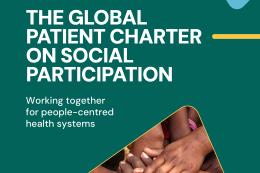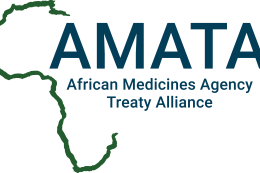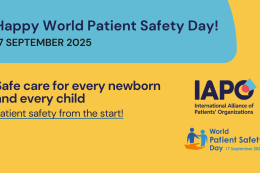IAPO collaborates with iPRI to access epidemiology and statistical support

The International Prevention Research Institute (iPRI) President Professor Peter Boyle signed an important Memorandum of Understanding with our Chair of the Board Jolanta Bilińska to mark the World Cancer Day.
The role of patients’ organizations is morphing rapidly from its initial lobbying focus to taking on a much more involved and proactive collaborative role by participating in clinical trial design and in the design and delivery of healthcare systems.
iPRI will work with IAPO in strengthening our research portfolio and providing the evidence-based information necessary in the current environment. iPRI will also benefit from having access to the patient’s voice in planning and executing its own research in a wide variety of disease areas including cancer, diabetes and multiple sclerosis.
IAPO's patient advocates in Africa will benefit immediately as iPRI also used the World Cancer day to release a landmark report on the State of Oncology in Africa giving a comprehensive picture supporting the need for trained oncologists, rehabilitative and palliative health care professionals, radiotherapy machines and other health devices, and essential chemotherapy and palliative care medicines .
The theme of World Cancer Day 2017 was “We can, I can” and highlighted the need for multisectoral participation. IAPO acknowledges the role of different stakeholders to strengthen coordination and health systems in cancer control. We therefore joined the International Prevention Research Institute (iPRI) as they released ‘The State of Oncology in Africa 2015’. It’s a report written about cancer in Africa by health professionals working in Africa or international colleagues working closely with Africa. The report speaks to the urgency of the problem. It makes the case for developing appropriate prevention, treatment, care and palliation policies. It highlights numbers such as over half of African countries have no radiotherapy units and/or outlaw the use of opiodes to treat pain?
The aim of the report is a call to action to African governments, foreign governments and international organizations to address the challenges posed by Cancer in Africa with specific, coordinated actions:
-There is a need to train more oncologists and health professionals in cancer care and provide the necessary infrastructure which is urgently needed to identify and treat patients.
-The drugs and equipment necessary to treat patients with cancer must be made available.
-Opioids must be available for controlling the pain of patients with terminal cancers (and other diseases).
-Since half of cancer in Africa is currently caused by chronic infection, relevant infection control and vaccination programmes must be funded.
-Information and education campaigns to wipe out stigma and misinformation must be conceived and disseminated.
-Making Universal Health Coverage globally available and strengthening health systems is critical for improving cancer care.
-High quality cancer institutions, all over the world, should establish collaboration ventures with cancer centres and institutes in every African country.
-International philanthropy is vital to help fund African countries
-The United Nations International Covenant on Economic Social and Cultural Rights (ICESCR) should be invoked as the basis for action.
The way forward for cancer worldwide is addressing the cancer burden through comprehensive cancer control, founded on global coordination and strong health systems.



